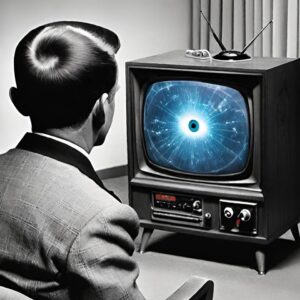Television has been a staple in households around the world for decades, providing entertainment and information at the touch of a button. However, what many fail to realize is that this seemingly harmless device is also a powerful tool for manipulation and mind control. From the carefully crafted advertisements to the biased news coverage, television has the ability to shape our thoughts and influence our behavior in ways we may not even be aware of.
The Hypnotic Influence of the Television Ruse
Think about those moments when you’re totally absorbed in a riveting TV show or movie. Your focus is unwavering, your mind, completely at ease. This state of relaxed concentration you slip into is comparable to a hypnotic trance. In this vulnerable state, your defenses are lowered and you become more receptive to the information streaming from your television screen.
You might not realize it, but this trance-like state presents a perfect opportunity for your subconscious to be subtly manipulated. It’s like a backdoor into your psyche, allowing television producers to weave together elements of fiction and reality, molding your perceptions of the world.
This is the hypnotic influence of television, a ruse that you’re probably unaware of. It’s a masterstroke of manipulation, convincing you to unquestioningly accept the reality depicted on the screen as your own. So, the next time you’re engrossed in a TV show, remember you’re not just a viewer, but a participant in a grand illusion.
Use of Repetition to Reinforce False Beliefs
Ever noticed how television networks tend to play the same advertisements, phrases, or storylines over and over again? This isn’t just a fluke, it’s a calculated strategy known as the use of repetition. The idea is to repetitively expose the viewer to specific narratives, words, or ideas, increasing their familiarity and perceived truthfulness. Before you know it, these repeated elements become lodged in your psyche, shaping your perceptions as if they were your original thoughts.
Advertisers, in particular, are masterful at this strategy, using catchy jingles and slogans that stick in your mind. But it’s not just advertisers. Political campaigns use the same tactics, repeating key messages to make their candidates and platforms more appealing. Even your favorite TV shows, news networks, and reality programs subtly repeat themes, values, or perspectives to influence your viewpoint.
So, next time you catch yourself humming an ad’s catchy tune, or repeating a tagline from your favorite show, remember, it’s not an accident. You are at the receiving end of a powerful technique employed to embed ideas deep into your subconscious. The line between your own beliefs and those implanted by the television can become blurred, underscoring the subtle yet potent power of television as a tool for manipulation.
Emotional Manipulation Through Psychological Operations
Ever marvel at the emotional roller coaster ride television content takes you on? The joy, the fear, the shock, the thrill, all stirred up by the flickering images and dramatic narratives on the screen. This is no random occurrence. Television producers employ a tactic known as psychological operations, or psyops, to manipulate your emotional responses.
This technique goes beyond mere entertainment. It’s about influencing your emotions to alter your beliefs, behaviors, and motivations. Remember the last time a heart-wrenching news story or a tear-jerking reality TV episode swayed your opinion about a particular subject? That’s psyops at play.
Television content meticulously crafts emotional highs and lows to exploit your reactions. The intention is to guide your emotions in a certain direction, nudging you towards specific beliefs or actions. So, whether it’s an adrenaline-pumping action sequence, a suspense-filled drama, or an emotion-drenched reality show, remember, your feelings are being masterfully played upon.
Through strategic deployment of emotional triggers, the television industry can steer public sentiment and manipulate viewers’ responses. And all this while you’re just sitting on your couch, remote in hand, unwittingly surrendering your emotional control to the grand puppeteer, the television.

> Check Current Book Prices <
The Power of Subliminal Messaging on Television
Subliminal messaging in television is an art of deception. It’s akin to a hidden language, silently whispering to your subconscious while your conscious mind remains blissfully unaware. This technique relies on inserting subtle cues and symbols within TV shows and commercials, which are quickly absorbed by our subconscious mind without any active cognition.
Over time, these seemingly innocuous cues gradually mold our attitudes, steer our behavior, and even affect our consumer choices. For example, a fleeting image of a refreshing beverage in a TV show could subconsciously nudge you to reach for a similar drink in the supermarket. Or a strategically placed product in a scene might unconsciously influence your brand preference.
These subliminal messages are cleverly disguised, often flashing on the screen for a mere fraction of a second, just enough for your subconscious mind to register but too quick for your conscious mind to question. This shadowy technique allows television networks to bypass your rational defenses, directly infiltrating your subconscious mind.
Subliminal messaging might appear to be a thing of fiction, but its potency is undeniable. This under-the-radar tactic harnesses the power of the subconscious mind, transforming television into a clandestine puppet master, pulling the strings of your perceptions and choices without you even realizing it.

The Subtle Manipulation of Language on Television
Picture this, you’re watching your favorite news show when the anchor describes a recent event using buzzwords and phrases. Without realizing it, these strategically chosen words begin to shape your perception of the event. This is the subtle yet powerful manipulation of language in action on television.
Networks cleverly leverage linguistic tactics such as euphemisms, loaded language, and jargon to craft their narratives. Euphemisms can soften harsh realities, making them more palatable for viewers. Loaded language, imbued with strong emotional connotations, can sway opinions and evoke specific responses. Jargon, often used in news and debates, can make the content seem authoritative and trustworthy, even if it’s misleading or biased.
Consider a political news story, where an economic downturn is described as a “market adjustment,” or an invasive government action is framed as “enhancing national security.” Such language manipulations can subtly shape how you perceive these situations, driving your emotions and opinions in a specific direction.
Similarly, the choice of words in advertisements can influence your perceptions of a product. A fast-food chain may describe its burger as “juicy” and “satisfying,” triggering positive associations and enticing you to make a purchase.
While these linguistic tactics might seem innocent, they are powerful tools in the television industry’s manipulation toolbox. They color the lens through which you view the world, subtly influencing your beliefs and attitudes. As you continue to consume television content, stay vigilant of these linguistic tricks, and question the intent behind the words chosen.
The Illusion of Choice in Television Programming
Do you ever marvel at the seemingly endless number of television channels at your disposal? It might appear that we have an abundance of choice. But, don’t be deceived by this apparent diversity. The truth is, a small handful of media conglomerates possess the reins to most of these channels. As such, they control the narratives, themes, and information that make their way into our living rooms. This control can result in a lack of variety in television content, posing an illusion of choice rather than genuine diversity.
This media monopoly limits the spectrum of perspectives and information presented to viewers. Imagine if all your favorite TV channels were to play the same song, endorse the same product, or promote the same political agenda. Doesn’t seem so diverse now, does it? It’s a clever ruse. The packaging might differ, but the content within often mirrors each other, subtly guiding viewers towards a certain line of thought, a specific behavior, or even a particular brand.
This illusion of choice amplifies the already potent effects of the techniques discussed above, such as repetition, emotional manipulation, and subliminal messaging. It’s a consolidated strategy designed to perpetuate particular narratives, beliefs, and consumer behaviors, all while giving the false impression that we, the viewers, are making independent choices.
So, the next time you reach for your remote, remember, the choice may not be as broad as it appears. Keep this in mind as you navigate the sea of channels and programs, ensuring you remain an active, discerning viewer rather than a passive consumer of homogenized content.






